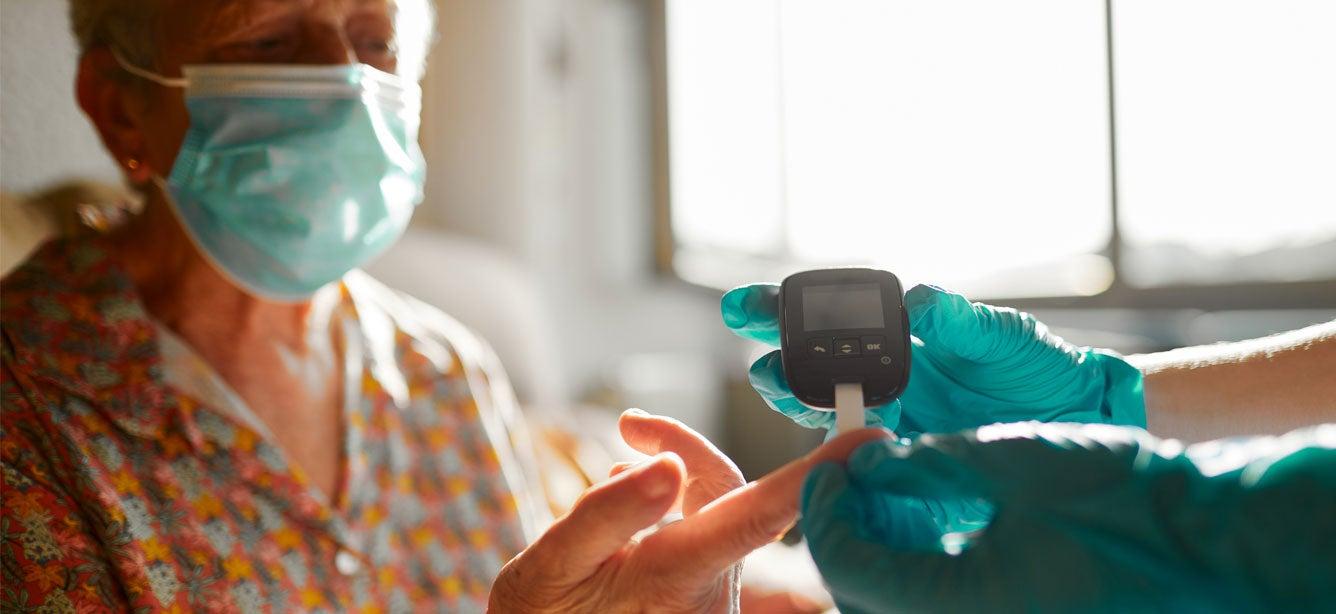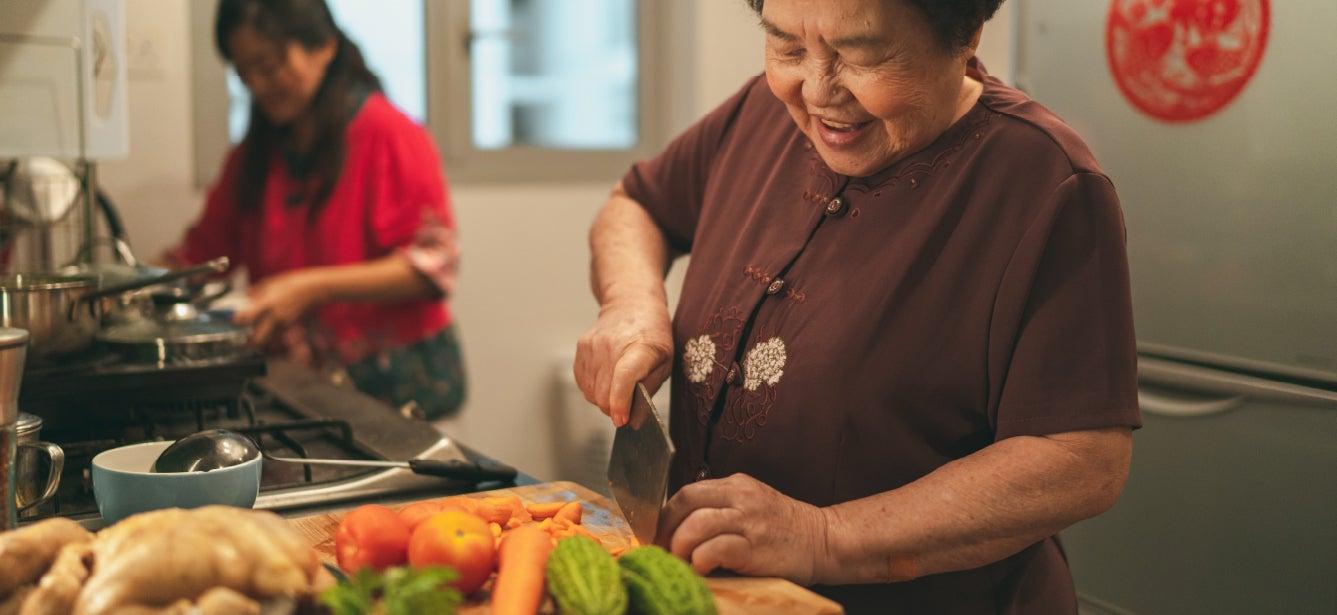
Related Topics
For the nearly 16 million adults age 65 and older living with diabetes,1 managing that condition requires adhering to a complex set of health behaviors that can be overwhelming, and burnout is common.
Older adults with diabetes also are likey to be dealing with at least one other chronic health condition.2 This can lead to diabetes distress, the emotional distress resulting from living with diabetes and the burden of what feels like relentless daily self-management.3 Feeling isolated and unsupported can magnify this problem.
But an intentional, positive, supportive social network can help older adults make and maintain necessary behavior changes to manage their diabetes.
How social connections help older adults manage diabetes
Social connections can play an important role in helping older adults manage diabetes, especially when combined with other health concerns.
You are not alone” should be a mantra of encouragement and hope to older adults managing diabetes.
This message should also be frequently reinforced at the point of medical care. Older adults with diabetes must have a support system that can buffer feelings of isolation. A supportive environment is necessary in public health; creating such an environment is what we do together as a society to ensure the conditions in which everyone can be healthy.4 Seeking help from family, friends, and the health care team is a necessary part of achieving optimum diabetes outcomes. Involving a family member or friend can reduce diabetes self-care challenges. However, the support received should not be controlling or intrusive.5
Psychosocial support is needed to deal with the emotional strain of living with a long-term illness like diabetes. In a photovoice study that used picture stories to describe their experiences living with diabetes, fear, denial, and stress were shared concerns.6 In the study, participants noted that family and church were sources of strength and encouragement. A participant commented that “the church, that’s my source of strength as well as support. Because others are there dealing with the same struggle that I have. And we often connect. We help each other.”
Family or friend support is also needed for medical visits. A health care provider only sees a small part of a patient’s life, which as a result, limits their full understanding of the ups and downs the older adult experiences managing their diabetes.5 It is for this reason a family member or friend can be a linkage between their medical team and the realities at home. They can be an advocate and a voice for unexpressed needs.
Coupling social support with diabetes self-management programs can boost success
Another area for social support is participating in a diabetes self-management education and support (DSMES) program. Inviting a family member or friend to participate in a DSMES class can be mutually beneficial. Together, both can practice healthy lifestyle habits relevant for both diabetes management and prevention. The older adult with diabetes receives support putting into practice what they learned, while their family member or friend becomes an informed partner able to help in more meaningful ways. This is especially important because self-care decision-making and skills mastery occur at home, where support is critical.
The value of DSMES cannot be understated. DSMES offers many benefits and is considered the cornerstone of care.7-8 DSMES focuses on empowering the person with diabetes by providing the tools to make informed self-management decisions.7
Live in Control: Activating patients and caregivers to manage diabetes together
Promising new research shows that a family or friend can be an effective resource for boosting a patient’s activation. “Activated” patients are those who have the “skills and confidence to become actively engaged in their health and healthcare.”9 The result: better health behaviors and outcomes.
Interventions focused on coaching the family and friend supporters to activate older adults with diabetes are needed. Live in Control, and its Spanish counterpart Vivir en Control, formerly ¡Sí, Yo Puedo Controlar Mí Diabetes! (¡Sí, Yo Puedo!), is a community-based DSME program designed to train the family or friend, referred to as “care supporter," in helping increase patient activation.10 The care supporter is integrated into the program where lesson activities use a team approach.
An emphasis of Live in Control is building good communication. Each week, the participant and care supporter schedule “team talk” to discuss concerns and need managing diabetes. This program exemplifies a practical approach to equipping and educating a family member or friend in their role in supporting a loved one with diabetes.
How to ask for help with diabetes care
“You are not alone” is at the heart of diabetes care. Providing ongoing social support to older adults with diabetes cannot be overlooked. With help from others, older adults can be motivated and activated in their self-care practices. Remember and share the A.S.K. acronym, three simple tips for older adults with diabetes to seek support:
- A—Ask for help. There are others at home, in your community, as well as your health care provider who can provide support or link you with the needed resources to manage diabetes.
- S—Share your needs or concerns. Make a list of areas where help is needed most.
- K—Know you are not alone. While managing diabetes is difficult, there are others who care for you and are willing to help.
Sources
1. Centers for Disease Control and Prevention. Prevalence of Both Diagnosed and Undiagnosed Diabetes. Found on the internet at https://www.cdc.gov/diabetes/data/statistics-report/diagnosed-undiagnosed-diabetes.html
2. Buttorff C, Ruder T, Bauman M. Multiple Chronic Conditions in the United States. Found on the internet at www.rand.org/t/TL221
3. Barnes MD, Hanson CL, Novilla LB, Magnusson BM, Crandall AC, Bradford G. Family-Centered Health Promotion: Perspectives for Engaging Families and Achieving Better Health Outcomes. J Health Care Organ Provision Finan. 2020;57, 1-6. Found on the internet at https://pubmed.ncbi.nlm.nih.gov/32500768/
4. Dan Grabowski D, Reino MB, Andersen TH. Mutual Involvement in Families Living with Type 2 Diabetes: Using the Family Toolbox to Address Challenges Related to Knowledge, Communication, Support, Role Confusion, Everyday Practices and Mutual Worries. Soc. Sci. 2019. Found on the internet at https://www.mdpi.com/2076-0760/8/9/257
5. Kreider KE. Diabetes Distress or Major Depressive Disorder? A Practical Approach to Diagnosing and Treating Psychological Comorbidities of Diabetes. Diabetes Ther. 2017; 8:1–7. dOI 10.1007/s13300-017-0231-1. Found on the internet at https://pubmed.ncbi.nlm.nih.gov/28160185/
6. Peña-Purcell N Cutchens L, McCoy T. (2015). “You’ve got to love yourself”: PhotoVoice stories from Hispanic/Latinos and African Americans living with diabetes. J J Transcultural Nurs, doi:10.1177/1043659617696976. Found on the internet at https://journals.sagepub.com/doi/abs/10.1177/1043659617696976
7. American Diabetes Association. Diabetes Care. Facilitating behavior change and well-being to improve health outcomes: Standards of Medical Care in Diabetes – 2022. Diabetes Care. 2022; 45(Suppl. 1) S60-S82. doi10.2337/dc22-S005. Foun on the internet at https://diabetesjournals.org/care/article/45/Supplement_1/S60/138923/5-Facilitating-Behavior-Change-and-Well-being-to
8. Anjali M, Khapre M, Kant R, Asha TJ. How Well a Culturally Adapted Diabetes Self-Management Education Program (DSME) Improves the Glycemic Control and Distress Among Diabetes Patients? J Cardio Diabetes Metab Disord. 2022;1:38-40. Found on the internet at https://www.cardiodiabetic.org/article.asp?issn=2772-6819;year=2021;volume=1;issue=2;spage=38;epage=40;aulast=Anjali
9. Rosland AM, Piette JD, Trived R, Kerr EA, Shelley Stoll S, Tremblay A, Heisler M. Engaging family supporters of adult patients with diabetes to improve clinical and patient-centered outcomes: study protocol for a randomized controlled trial. Trials. 2018;19:394. Found on the internet at https://doi.org/10.1186/s13063-018-2785-2
10. Peña-Purcell N. Live in Control. Unpublished. 2022.
This project was supported, in part by grant number 90CSSG0048 from the U.S. Administration for Community Living, Department of Health and Human Services, Washington, D.C. 20201. Grantees undertaking projects under government sponsorship are encouraged to express freely their findings and conclusions. Points of view or opinions do not, therefore, necessarily represent official Administration for Community Living policy.




